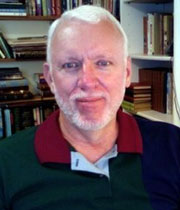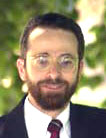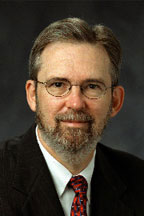Does Jude Condemn Gays? by Rick Brentlinger
by Rick Brentlinger

The sin that Jude condemns is humans having sex with angels. He does not mention or condemn homosexuals and lesbians, yet many anti-gay Christians take the following verses out of context to condemn gays and lesbians. They assert (falsely) that verse 7 is a negative attack on gay men and lesbian women.
The fact that scripture uses the Greek word, heteros, from which we get our English word, heterosexual, and does not use the Greek word, homoios, from which we get our English word, homosexual, indicates that the point at issue with God is not homosexuality. The sin that Jude condemns is humans having sex with angels.
Jude 1:5-7 KJV
5 – Now I desire to remind you, though you know all things once for all, that the Lord, after saving a people out of the land of Egypt, subsequently destroyed those who did not believe.
6 – And the angels which kept not their first estate, but left their own habitation, he hath reserved in everlasting chains under darkness unto the judgment of the great day.
7 – Even as Sodom and Gomorrah, and the cities about them in like manner, giving themselves over to fornication, and going after strange flesh, are set forth for an example, suffering the vengeance of eternal fire.
What does this passage mean?
Jude’s purpose is to show that God punishes the wicked and delivers the righteous. He illustrates his point by citing three examples.
Example 1:
Israel’s exodus from Egypt – the righteous Jews were delivered; the wicked Egyptians were destroyed. (Jude 1:5)
Example 2:
Humankind before Noah’s Flood – Noah’s righteous family was delivered; wicked humanity was destroyed and the fallen angels were imprisoned, chained in darkness awaiting God’s judgment. (Jude 1:6)
Also Genesis 6:4,5 NKJV
4 – There were giants on the earth in those days, and also afterward, when the sons of God came in to the daughters of men and they bore children to them. Those were the mighty men who were of old, men of renown.
5 – Then the LORD saw that the wickedness of man was great in the earth, and that every intent of the thoughts of his heart was only evil continually.
Example 3:
Inhabitants of Sodom – Righteous Lot and his two daughters were delivered; the wicked people of Sodom were destroyed. (Jude 1:7)
Three Important Points
I
Jude 7 links fornication and strange flesh, not human flesh, so in context Jude is referring to angels, not to gay men, not to lesbian women, not to bisexuals, not to transsexuals. And by the way, that is not a “gay” interpretation. Many anti-gay heterosexual Christian scholars teach the same thing GayChristian101 teaches about this passage.
II
Jewish teaching in the first century AD was that the women of Sodom were trying to have sex with fallen angels so they could have supernatural children, like the giants in Genesis 6:2-13, who were the product of sex between earthly women and “the sons of God” (fallen angels).
These fallen angels changed the order of their nature and had sexual relations with the daughters of men, Testament of Naphtali 3:3-5. In the Sodom story, the men of Sodom tried to gang rape the angel visitors. The link is humans attempting to have sex with angels, not homosexuality – two men or two women falling in love and getting married.
III
According to many anti-gay Christians, the men of Sodom were “going after strange flesh” alleged by anti-gay Christians to mean homosexual sex, attempting to have sex with someone of the same gender.
When we consider what the Bible actually says however, that interpretation is nonsense because the Bible never says that in the Old Testament or the New Testament.
When gay Christians disagree with the illogical but traditional interpretation, does that mean gays are trying to alibi their sin? Or do many heterosexual Christians agree with gay Christians that Jude describes a “sex with angels” problem? Surprisingly, even a conservative Calvinist Bible teacher like John MacArthur rejects the convoluted traditional interpretation and agrees with gay Christians – that its a “sex with angels” issue.
Please Note: Bolding in the following quotes is by Rick Brentlinger
1. Expositor’s Bible Commentary
Comments on Jude 7
“The second example is of the fallen angels. The most likely reference here is to the angels (“sons of God,” cf. Gen 6:4; Job 1:6; 2:1) who came to earth and mingled with women. This interpretation is expounded in the pseudepigraphical Book of Enoch (7; 9.8; 10.11; 12.4), from which Jude quotes in v. 14, and is common in the intertestamental literature and the early church fathers (e.g., Justin Apology 2.5)…
The third example of judgment is that of the cities of the plain, Sodom and Gomorrah… The key factors are “these” ) toutois – masculine, referring to “angels” (v. 6), not cities (feminine), and the words “different flesh” (sarkos heteras).
Thus the sin of Sodom and Gomorrah was seeking union with “different flesh” in a way similar to what the “sons of God” (angels?) did (Gen 6:2) when they mingled with “the daughters of men” (humans).”
– The Expositor’s Bible Commentary, Volume 12, Zondervan, Jude, p. 390, written by Dr. Edwin A. Blum, B.S., Bob Jones University, Th.M., Th.D., Dallas Theological Seminary, D. Theol., University of Basel, Switzerland
2. Anti-gay Author Dr. Robert Gagnon
Pittsburg Theological Seminary
Comments on Jude

Here is Dr. Gagnon’s personal translation of Jude 6-7.
“6 – Angels, too – those who had not kept their own sphere of influence (or: position of authority, rule, station, domain; archen) but who had left behind (or: deserted, abandoned) their proper dwelling – he (i.e., the Lord) has kept until (or: for) the judgment of the great Day in eternal chains under (or: in) darkness (i.e., of the nether regions),
7 – (just) as Sodom and Gomorrah and the cities around them, which, in a manner similar to these (or: in the same way as they; ton homoion tropon toutois), committed sexual immorality (ekporneusasai) and went after ‘other flesh’ (or: strange/alien flesh, another kind of flesh, flesh other than their own, i.e., angelic flesh; kai apelthousai opiso sarkos heteras), are set before us (or: are exhibited) as an example by undergoing a punishment of eternal fire.”
Dr. Gagnon says about this passage:
“The two actions (committing sexual immorality and pursuing angels) are to be treated as related, but distinct, actions… In their lust for sexual intercourse with other men, the men of Sodom inadvertently put themselves in the sacrilegious position of pursuing sexual intercourse with angels. “In like manner” the false believers, against whom Jude wages combat, had through their lust for immoral sexual behavior come into conflict with the angelic guardians of this world order.
Jude sees the actions of the Sodomites as sharing similarities with the actions of the rebellious angels, known as “the Watchers,” recorded in Genesis 6:1-4 and in much Second Temple Jewish literature (note the expression “in a manner similar to these [angels]” in v. 7). Jude also sees similarities between these two actions and the actions of the false believers criticized in Jude’s letters (note the word “similarly” introducing v. 8).
…The actions of the Sodomites in “committing sexual immorality and going after other flesh” bear similarities to the actions of the rebellious angels in copulating with humans.”
Dr. Gagnon believes Jude is making a negative comment about homosexuality although his interpretation seems strained to me, especially in view of his translation and comments above.
3. The NET Bible – Comments on Jude

“Greek “strange flesh” – This phrase has been variously interpreted. It could refer to flesh of another species (such as angels lusting after human flesh). This would aptly describe the sin of the angels, but not easily explain the sin of Sodom and Gomorrah.
It could refer to the homosexual practices of the Sodomites, but a difficulty arises from the use of ΔÏΔÏÎżÏ (hetero”; “strange,” “other”). When this is to be distinguished from áŒÎ»Î»ÎżÏ (allos, “another”) it suggests “another of a different kind.” If so, would that properly describe homosexual behavior?
In response, the language could easily be compact: “pursued flesh other than what was normally pursued.” However, would this find an analogy in the lust of angels (such would imply that angels normally had sexual relations of some sort, but compare with Matthew 22:30.
Another alternative is that the focus of the parallel is on the activity of the surrounding cities and the activity of the angels. This is especially plausible since the participles áŒÎșÏÎżÏΜΔÏÏαÏαÎč (ekporneusasai, “having indulged in sexual immorality”) and áŒÏΔλΞοῊÏαÎč (apelqousai, “having pursued”) have concord with “cities” (ÏÏλΔÎčÏ, poleis), a feminine plural noun, rather than with Sodom and Gomorrah (both masculine nouns). If so, then their sin would not necessarily have to be homosexuality.
However, most likely the feminine participles are used because of constructio ad sensum (construction according to sense). That is, since both Sodom and Gomorrah are cities, the feminine is used to imply that all the cities are involved.
The connection with angels thus seems to be somewhat loose: Both angels and Sodom and Gomorrah indulged in heinous sexual immorality. Thus, whether the false teachers indulge in homosexual activity is not the point; mere sexual immorality is enough to condemn them.”
See The NET Bible – a product of theologically conservative Dallas Theological Seminary alumni, on Jude 6 and 7.
4. Gay Scholar Bruce Gerig
Comments on Sex With Angels
“Some have felt that the little letter of Jude condemns homosexual acts, but closer scrutiny casts doubt on this. Jude wrote to condemn certain deceivers who had crept into the church, denying the lordship of Christ and introducing sexual misconduct (v. 4).
These disruptive non-believers, he warns, shall be punished like the angels (= the “sons of God” in Gen 6:1-4) who left their heavenly station to experience sex with human women (Jude vv. 5-6). In the same way, Jude says (“just as”), “Sodom and Gomorrah and the surrounding cities … likewise acted immorally and indulged in unnatural lust (Gk. sarkos heretas)…” (v. 7).
The Greek here means, literally, to go after “other/different flesh.” Although this has been variously translated as “perversion” (NIV), “unnatural lust” (RSV2), and “lust of men for other men” (LB), a closer look shows that these can hardly be correct translations.
Heteros is used elsewhere in the NT to refer to “other” tongues (a foreign or heavenly language, Acts 2:4), a “different” Gospel than Paul taught (Gal 1:6), and “another” glory (magnificence) that distinguishes earthly forms (e.g. mountains, seas, wild areas) from the heavenly sun, moon, and stars
(1 Cor 15:40).
In contrast, two gays share “natures [that] are only too alike” (J. Chaine and J.N.D. Kelly) – not “other” or “different.” But now angelic “flesh,” that would be very different! In fact, two grammatical connectors here (“just as” and “likewise”) tie verse 7 tightly to verse 6 and require that the “different flesh” lusted after in Sodom be similar to the error of the fallen angels in Gen 6. In other words, this refers to the mob in Sodom wanting to have sex with the angelic visitors.
Dr. Robert Gagnon holds that the men of Sodom did not know that the visitors were angels – yet the ancient Jewish author of the Testament of Asher (7:1) declared that they should have.
Von Rad envisions “the heavenly messengers (who came to Sodom) as young men in their prime,” whose beauty would naturally have turned heads (one can hardly imagine that they came as old hunchbacks). Whatever the case, the Sodomites’ attention was focused on the wrong thing – on sexual violence, instead of caring for needy strangers.
Although the Jude text is somewhat vague, what is specifically condemned here is certain “carousing” that has been introduced at the church’s “love feasts” (v. 12, communal church fellowship meals, which also included sharing the Lord’s Supper). In a similar passage (and situation) in II Peter 2:13,14, the apostle also condemns carousing in the church, connecting it specifically with (heterosexual) “adultery”.”
5. Other Sheep
Comments on
Homophobic Misinterpretation
“Jude’s letter reflects an early Palestinian milieu… At first glance this emphasis might appear to contradict Jesus’ own focus on Sodom’s refusal to be hospitable to homeless travelers. Such a misconception is easily bolstered by common translations, which are incredibly homophobic.
“Sodom and Gomorrah and surrounding towns gave themselves up to sexual immorality and perversion” (NIV Jude 7).
Given the background of centuries of misinterpretation of the Sodom narrative, probably most modern readers will think “homosexuality” on seeing the word “sexual immorality” (Greek: porneuo), but on seeing the word “perversion” they will have no doubt – and with even a small injection of outmoded Freudianism, may consider Jude quite perceptive scientifically to think that homosexuality represents a “perversion.”
However, any accurate translation will make clear that Jesus’ brother (Jude) also rejects the homophobic misinterpretation of the Sodom story, which arose in inter-testamental Judaism…
Jude, however, like his brother (Jesus), calls us back to the original meaning, indicating that the sexual dimension of Sodom’s sin involved going after “flesh” (Greek: sarkos) that was “different/strange” (Greek: heteras).
The Jerusalem Bible footnote summarizes well the conclusions of modern scholarly studies, pointing out that Jude recognized that the Sodomites were attempting to have sexual relations with angels.
The incredible prejudice of modern translators is seen in the fact that they take the Greek word heteras (from which we get the word heterosexual) and translate with terms like “perversion”, making modern readers think Jude is denouncing homosexuality.”
6. Anglican Scholar J.N.D. Kelly
Comments on Jude

“This being the allusion here, many have interpreted lusted after different flesh (heteras sarkos) as meaning ‘indulged in sodomy’.
The Greek, however, does not tolerate this: it simply states that the flesh they desired was different (these good angels appeared in human form, but their flesh presumably was different in kind), whereas in homosexuality, as
J Chaine (ad loc.) aptly remarked, ‘the natures are only too alike’. p. 259:
Both had made their sin even more appalling by lusting after different flesh – the angels (in Genesis 6), because, spiritual beings though they were, they had coveted mortal women, and the Sodomites because, though only human beings, they had sought intercourse with angels.”
A Commentary on the Epistles of Peter and of Jude, JND Kelly (Anglican scholar), Harper and Row: New York, 1969, p. 258
7. Methodist David Horrell
Comments on Jude
“Like the angels, these people ‘indulged in sexual immorality’ (NRSV) and ‘went after other flesh’ – ie non-human flesh. This last phrase is a better and more literal translation of the Greek than indulged in unnatural lusts because, as the account in Genesis 19:1-26 makes clear, it was two angels with whom the men of Sodom wanted to have sexual intercourse.
This is why the two examples in verses 6 and 7 are comparable for Jude, and why it cannot be homosexual intercourse which the author has in mind here: just as the angels left their proper place and indulged in sexual immorality with humans, so the men of Sodom sought to violate the proper order in creation and to have sex with angels.”
The Epistles of Peter and Jude, David Horrell,
Epworth Press: Peterborough, 1998, p. 121
8. Fred Craddock
Comments on Jude

“The third and final lesson warns against sexual immorality, a warning that draws upon the classic case of Sodom and Gomorrah
(Genesis 19). That the men of Sodom and Gomorrah “pursued unnatural lust” (“pursued other flesh,” v. 7) involved more than homosexuality.
They desired sex with the two supernatural beings who visited Lot. For Jude, what happened between angels and humans in
Genesis 19 that brought down God’s fire was similar to what happened between angels and humans in Gen 6:1-4 that brought down God’s flood.
That the intruders in the church had some unhealthy fascination with angelic beings (vv. 8-9) should not go unnoticed, even though the causes and expressions of that relationship are not clear to us. It is evident in verse 8 that these disrupters are so arrogant as to blaspheme the angelic servants of God who bring God’s message and execute God’s judgments. In other words, they are in total rebellion against heaven.
But verses 6-7 at least imply a connection or a desired connection between the troublemakers and supernatural beings by means of sex.”
First and Second Peter and Jude, Fred Craddock,
Westminster John Knox Press: Louisville, 1995, p. 139
9. Richard Bauckham
Comments on Jude
“which practiced immorality in the same way as the angels and hankered afer strange flesh.” The second clause explains the first. As the angels fell because of their lust for women, so the Sodomites desired sexual relations with angels. The reference is to the incident in Gen 19:4-11.
sarkos eteras “strange flesh,” cannot, as many commentators and most translations assume, refer to homosexual practice, in which the flesh is not “different” (eteras); it must mean the flesh of angels… The two cases are similarly brought together in T. Napht 3:4-5.”
Richard Bauckham, Jude, 2 Peter,
Word Books: Waco, 1983, p. 54
10. Michael Green of InterVarsity
Comments on Jude
“The men of Sodom and Gomorrah engaged in homosexuality: that was unnatural. But Jude may mean that just as the angels fell because of their lust for women, so the Sodomites fell because of their lust for angels (sarkos heteras indeed!).
Michael Green,
The Second Epistle General of Peter and the General Epistle of Jude,
Inter-Varsity Press: Leicester, 1987, p. 180
11. CEB Cranfield
Comments on Jude
“But it is more probable that the reference is to the fact that, as the fallen angels had sought intercourse with human beings, so the men of Sodom sought intercourse with angels (the two angels in p. 160: Lot’s house). This interpretation is confirmed by the following clause, gone after strange flesh, ie, after that belonging to a different order of being. To interpret ‘strange’ as referring to the unnaturalness of intercourse with the same sex is scarcely possible.”
CEB Cranfield, I and II Peter and Jude,
SCM Press: London, 1960, p. 159
12. Dr. Richard Hays
Duke Divinity School, New Testament Scholar
Comments on Jude

“The phrase “went after other flesh” (apelQousai opisw sarkos heteras) refers to their pursuit of non-human (ie angelic!) “flesh.” The expression sarkos heteras means “flesh of another kind”; thus, it is impossible to construe this passage as a condemnation of homosexual desire, which entails precisely the pursuit of the same kind.”
Richard Hays, The Moral Vision of the New Testament,
Harper: San Francisco, 1996, p. 404
Dr. Hayes believes all intimate gay relationships are sinful, which makes his conclusion about Jude 7 all the more interesting.
Our Honest Conclusion:
The sin of Sodom was not men violating other men
but men attempting to violate angels.
Sodom and Gomorrah’s sin was wickedness and rebellion against God, not homosexual sex, not lesbian sex, not transsexual sex. Jude references Sodom in connection to angels, Jude 6, who rebelled against God and left heaven, “left their first estate.” These fallen angels had sex with earthly women and produced offspring part human and part fallen angel.
Jude 7 reveals that the issue in Sodom and Gomorrah was not homosexual sex, which produces no children but heterosexual style sex (specifically attempted rape) between humans and angels.
When Jude says: “going after strange flesh” he is referring to sex between humans and angels, not homosexual sex between humans and not committed, faithful same sex partnerships. As demonstrated above, many theologians, including many conservative Christians, understand the passage this way.
The sin of Sodom was not men violating other men
but men attempting to violate angels.
Related Links About the Real Sin of Sodom
1. The Babylonian Talmud views lack of Hospitality as the sin of in Sodom.
2. Read this before you dismiss Inhospitality as the sin of Sodom in Genesis 19.
3. Hospitality Means Loving Strangers.
4. History And Scripture Clearly Identify The Sin in Genesis 19.
5. In The Bible, sodomites were shrine prostitutes, not homosexuals.
More Excellent Articles
Sodom: A Traumatic Scene Revisited by Bruce L. Gerig.
Sodom: An Ancient Story Refashioned by Bruce L. Gerig.
Discover How To Be Saved Today
Some of the quotes on this page are from Jeramy’s interesting website
Rick Brentlinger is a conservative Independent Baptist minister. He has served as a Church Planting Missionary, Bible Institute Instructor and Pastor at churches in Colorado, Hawaii, Virginia and Florida.
Rick is the author of the non-fiction classic, Gay Christian 101 – Spiritual Self-Defense For Gay Christians, available on Amazon or directly from the Gay Christian 101 Website.
Rick ministers to the GLBT community through his book and website.
Read Rick’s personal “Coming Out” story.
Jude Article ©2009 Rick Brentlinger. All rights reserved. Used with Permission and Gratitude.